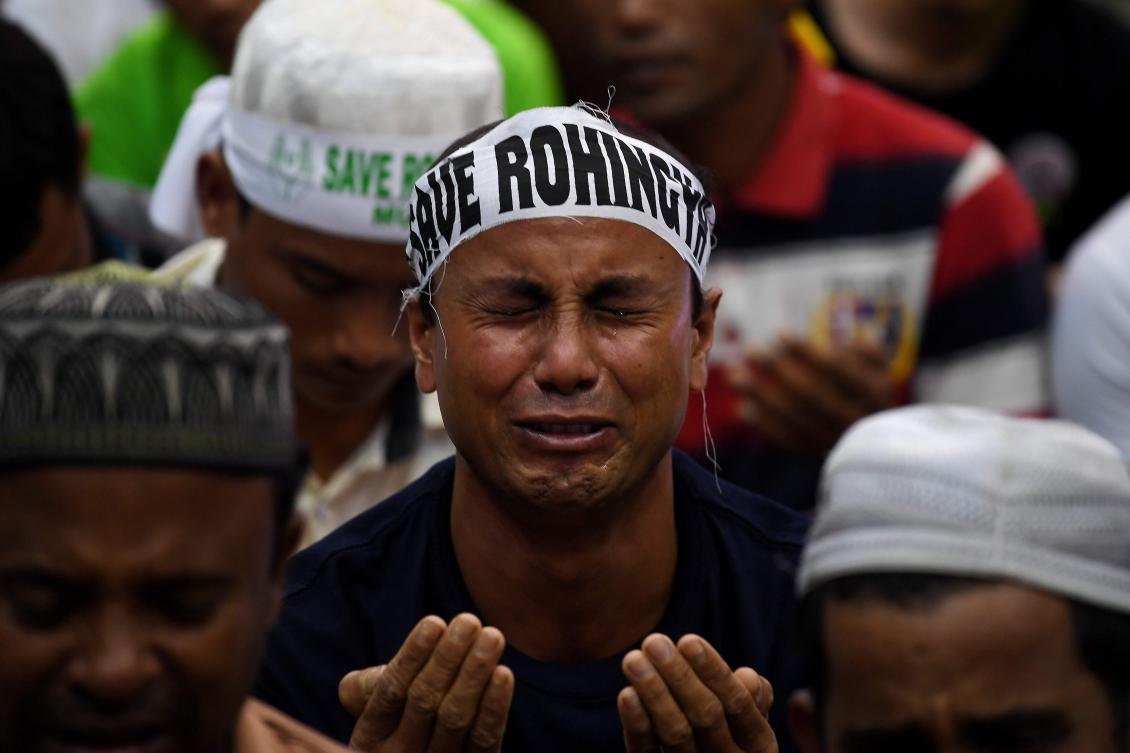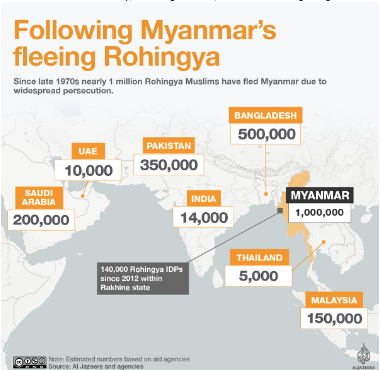The Rohingya deportation
January 9, 2019 | Expert Insights

After India, Kingdom of Saudi Arabia has deported illegal Rohingyas immigrants to Bangladesh where they will become refugees. KSA is reversing their historic stance of standing by the persecuted Muslim Rohingyas for years at International level.
Background
The Rohingya are an ethnic Muslim minority group from Myanmar’s western Rakhine state. Their origin can be traced back to the 15th century when thousands settled in Myanmar from the Arakan Kingdom. Practising a variation of Sunni Islam, there is reportedly one million Rohingya in Myanmar.
The Myanmar government regards the Rohingya as illegal immigrants from the Indian subcontinent and refuses to grant them citizenship status, effectively making them stateless. They cannot travel, get married or seek medical treatment without official permission. Many reports say that Rohingyas also face persecution, forced labour, land confiscation and limited access to education even though generations of Rohingya have lived in Myanmar.
More than 700,000 Rohingya Muslims have fled to Bangladesh from western Myanmar’s Rakhine state. The huge exodus of Rohingya began in August 2017 after Myanmar security forces launched a brutal crackdown following attacks by an insurgent group on guard posts. The scale, organization and ferocity of the operation led to accusations from the international community, including the U.N., of ethnic cleansing and genocide.

Analysis
Dozens of Rohingya are being deported from Saudi Arabia to Bangladesh, despite being from neighbouring Myanmar. Many of them reportedly entered Saudi Arabia on pilgrimage visas but overstayed to work.
Some Rohingyas were put in handcuffs after they attempted to resist their deportation to Bangladesh. Some of the immigrants were locked up in a Saudi detention centre for up to six years before being deported.
"I've been here for the last five to six years, now they are sending me to Bangladesh. Please pray for me," the man in the video said. They came to our cells in the middle of the night, telling us to pack our bags and get ready for Bangladesh," a Rohingya detainee, who wished to remain anonymous, told MEE. "Now I am in handcuffs and being taken to a country I'm not from - I am Rohingya, not Bangladeshi."
Nay San Lwin, a Rohingya activist said that most of the Rohingya entered Saudi Arabia in 2012 following violence breaking out in Rakhine state, searching for a better life. Nay San explained that upon entering Saudi Arabia, their fingerprints had been registered as "Indian, Pakistani, Bangladeshi, Nepalese" as the Rohingya identity isn't accepted. "According to Saudi law, since they are registered as a different nationality, we can't do anything in terms of legal help," Nay San said. "Saudi brought four embassy officials to the detention centre. Three embassies refused to accept them; Bangladesh was the only one to accept them." Nay San said that human rights activists have been appealing to Saudi authorities for the past two years and that he has approached Saudi officials, diplomats, but "no one is ready to help". Activists are approaching the European government to appeal to the Saudi authorities, he said.
On January 3, India deported a family of five Rohingya Muslims lodged at an Assam prison to Myanmar. A day before that a Rohingya Muslim migrant from Myanmar's Rakhine state who was kept at Ambala jail in Haryana was sent back. This was the second batch of Rohingya immigrants sent to Myanmar. A batch of seven Myanmar nationals, believed to be Rohingya Muslims, were handed over to their country in October 2018 through the Manipur border after the Supreme Court refused to stop the first such deportation from India. Amnesty International accused India of disregarding international law.
"The expulsion of asylum-seekers and refugees amounts to a violation of India's obligations under customary international law, which prohibits governments from returning people to a territory where they are at risk of serious human rights violations." Amnesty India's Abhirr V. P. said in a statement.
Japan has reiterated its support for the safe, voluntary return and resettlement of Rohingyas, who had to take shelter in Cox’s Bazar to escape the brutalities of the Myanmar security forces and other non-state actors, in Rakhine.
Assessment
Our assessment is that the forceful repatriation of Rohingyas to Bangladesh and onwards to Myanmar where the legal status for Rohingyas is non- existent continues to let them be stateless. We feel that the crisis which began between Buddhists and Muslim minorities in Myanmar has now led the Rohingyas to be secluded from other countries which believe that their growth affects national security. We feel that these refugees can be courted by extremist groups and terrorist activities cannot be prevented if the scale of refugees continues to grow in Bangladesh.








Comments